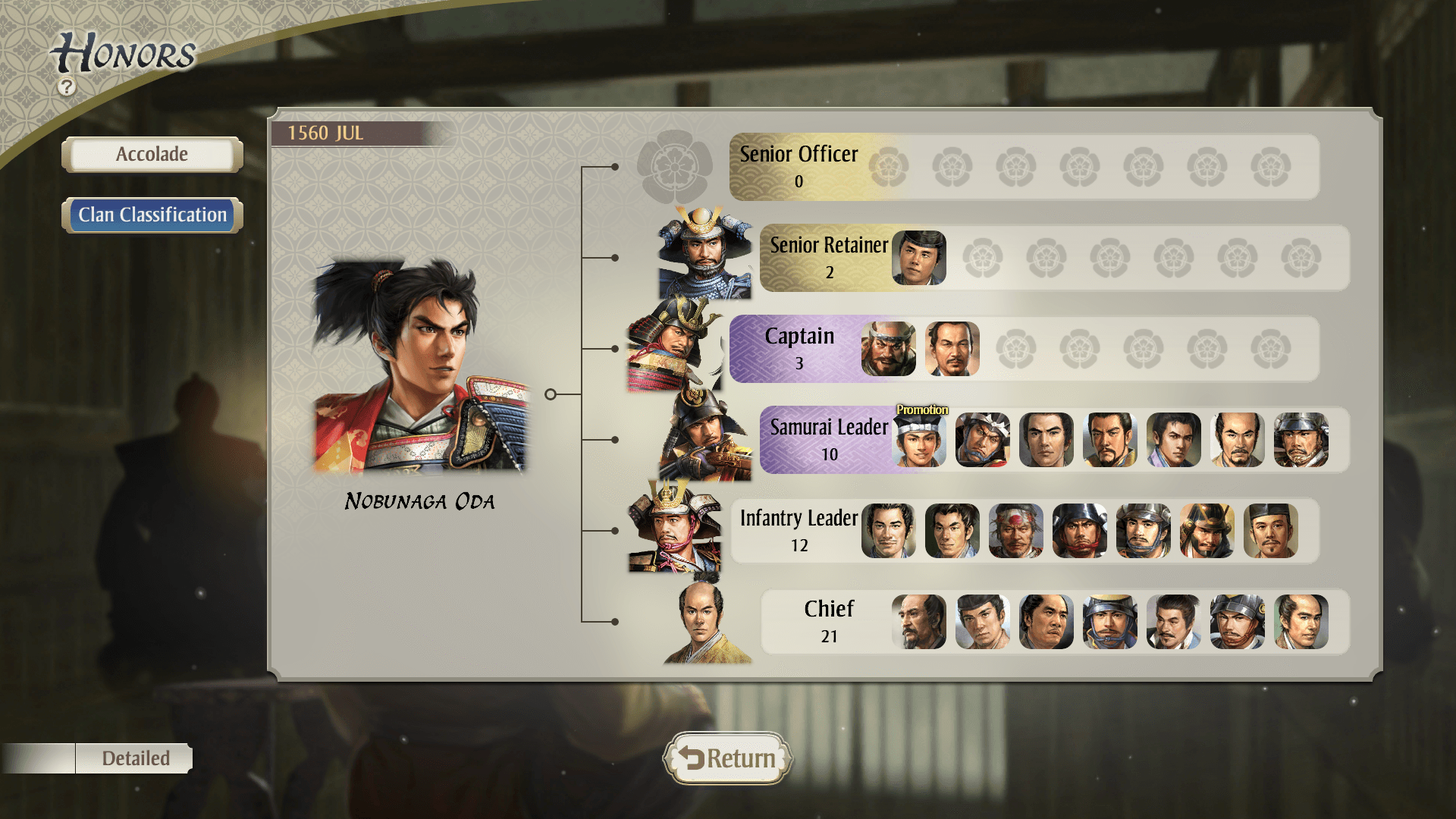Honor Commendation
Officers who earn achievements can be given a letter of commendation, which will allow them to take an alias.
Additionally, officers will rise in station in accordance with the honor they have acquired. This is updated once every season (every three months).
Select Council > Honor Commendation from the command menu.
Accolade

Give letters of commendation to officers who have earned achievements.
This will allow them to take an alias, and their loyalty and honor will increase.
How to Acquire Achievements
- Occupation: Occupy a county or castle.
- Battle: Perform admirably in battles and sieges, such as by destroying units.
- Covert Action: Carry out or prevent covert actions.
- Civil Affairs: Add town facilities, implement land measures, issue policies, or perform diplomacy.
Alias
Giving an officer a letter of commendation grants them an alias befitting their achievements, which increases their abilities and may bestow special effects.
There are different aliases for achievements in occupation, battle, covert actions, and civil affairs.
Each officer can only have one alias. If they gain more achievements and are given more letters of commendation, its level will be raised, and the alias will become more prestigious (up to LV4).
Clan Classification

Once an officer has gained a certain amount of honor, their station will rise automatically during the honor commendation that occurs once every three months.
How to Acquire Honor
- Develop the domain assigned as dominion or as a substitute
- Execute orders as the assigned officer
- Successfully execute submissions
- Resolve territorial problems
- Earn achievements while marching or in battle
- Work as a chief (*Requires the issuance of the Bodyguard Formation policy.)
- Receive letters of commendation
Station
Once an officer has gained a certain amount of honor, their station will rise automatically during the honor commendation that occurs once every three months.
Honor is acquired in proportion to the number of activities performed.
As an officer's station rises, they will become capable of governing counties and castles. If they become a captain or above, their lord's dominion (how many counties can be simultaneously assigned to one lord) will also increase.
| Chief | Can be appointed as a substitute. |
|---|---|
| Infantry Leader | Can be appointed as a substitute or land holder. |
| Samurai Leader | Can be appointed as a substitute, land holder, or lord. |
| Captain | Can be appointed as a substitute, land holder, or lord. Can be assigned to issue policies or mediate. Can be appointed as an overseer. Lord's dominion (the number of counties assignable to a lord) increases slightly. |
| Senior Retainer | Can be appointed as a substitute, land holder, lord, or regent. Can be assigned to issue policies or mediate. Can be appointed as an overseer or conservator. Lord's dominion increases moderately. |
| Senior Officer | Can be appointed as a substitute, land holder, lord, or regent. Can be assigned to issue policies or mediate. Can be appointed as an overseer or conservator. Lord's dominion increases greatly. |
Employment
Appointing an officer changes their employment. If an officer is assigned an employment beneath their station (for example, appointing a senior retainer as a substitute), their loyalty will decrease.
| Attendant | Has no appointment and is on standby at the main base. |
|---|---|
| Substitute | A substitute in the directly controlled land. Although they directly support the daimyō, it is a low position. |
| Land Holder | Supports the lord. |
| Lord | Leads land holders. |
| Regent | An important role that is responsible for governing the lords of a province. |